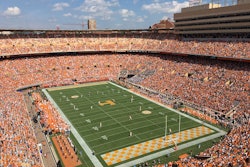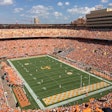Copyright 2017 The Deseret News Publishing Co.
Deseret Morning News (Salt Lake City)
SALT LAKE CITY — The Utah High School Activities Association filed a lawsuit against the state of Utah and the State School Board Wednesday over last year's efforts to usurp its independence and power to oversee high school sports — especially the transfer of athletes between schools.
The lawsuit, filed in 3rd District Court Wednesday, takes aim at both the Utah State Board of Education for imposing changes to the association's transfer rules, and the Utah Legislature for passing a law that changes the governing board of the association and subjects the private, nonprofit corporation that has overseen high school sports and activities for 90 years to state regulations and standards.
The lawsuit asks a judge to declare the law unconstitutional and asks for an injunction preventing it from being enforced.
"The member schools felt that the statute and the board of education rules were unfairly directed only toward the association," said association attorney Mark Van Wagoner, "and that the actions taken, which were laid out in the complaint, (are) retribution for fairly enforcing association rules against a member school. ... This should be of great concern to all private organizations."
The lawsuit offers an explanation for why the association believes the State School Board and the Utah Legislature targeted it.
The complaint says the association's oversight of 19 sanctioned sports — as well as speech and debate, music and theater — has been cooperative with both the State School Board and the Legislature for most of its 90-year history.
"That changed in the spring of 2016," the complaint says. "In May of 2016, the UHSAA was provided with evidence that a Summit Academy football coach had been engaged in recruiting students to Summit for the purpose of playing football. Such recruiting is prohibited by a long-standing, fundamental UHSAA rule. Pursuant to its rules and consistent with its uniform procedures, the UHSAA afforded Summit both an initial hearing and an appeals hearing. At each hearing it was determined that the coach had recruited, and the penalties commensurate with the offense were imposed."
The coach responsible for the recruiting violation worked as an assistant in the football program, and he was no longer employed by Summit Academy when the 2016 hearings took place.
The animosity increased in August of 2016 when two football players were denied eligibility as transfer students.
"Summit threatened the UHSAA, reminding the UHSAA that the board of trustees of Summit included chair of the Utah State Board of Education David Crandall, and the speaker of the Utah House of Representatives, Greg Hughes, and threatening the UHSAA should the eligibility of the two players not be granted," the suit states. "In fact, representatives said that the UHSAA would be 'destroyed.' "
Both men made good on those threats, the suit alleges, when the State School Board changed its rules to dictate exceptions to the association's transfer rules, as well as when the Legislature passed HB413 in March.
The suit singles out Hughes, saying that he made unfounded claims that the association made decisions based on "'prejudice, hubris and arrogance' rather than based on the UHSAA's predetermined guidelines."
"Hughes even publicly threatened to have the state auditor, John Dougall, investigate the UHSAA's finances, even though the UHSAA is a private organization falling outside the purview of the Utah state auditor's oversight and even though the dispute with Summit had nothing to do with the UHSAA's finances, and there has never been any allegation of financial impropriety by the UHSAA."
Furthermore, the suit alleges, "Hughes made clear that even though the UHSAA, as a private organization, does not take any tax money, he was looking for an angle to get a regulatory 'foot in the door.' "
A spokesman for Hughes said he was out of town Wednesday and could not be reached for comment.
The State School Board rule passed in December, while the legislative effort began in February. Hughes and Majority Whip Rep. Francis Gibson, R-Mapleton, convened a private working group that included two voting members of the association's board of trustees.
While they began with discussions of the transfer issue, eventually HB413, sponsored by Gibson, only addressed the makeup of the association's governing board of trustees. At issue in the lawsuit is that it forbids any public school from joining an association that doesn't comply with the governmental standards like open meetings and records laws, essentially making the private nonprofit subject to governmental rules.
The law also established an outside, three-member appeals panel that would review association decisions (if parents or schools sought redress). That panel only decides if the association followed its bylaws in making a decision, and so far it's heard one case since taking effect July 1. The panel found in favor of the association in that case, although a written decision is still pending.
"The clear purpose of the act, evident from its wording, is to take a private nonprofit corporation and subject it to government oversight and control, turning the association into a de facto government agency," the complaint states.
Open meetings acts, governmental records acts and employees' ethics acts are all now applicable to the Utah High School Activities Association and its member schools.
"In the past, these provisions have been applied exclusively to state agencies," the complaint states. "No other private, nonprofit entity in the state is subject to these regulatory provisions."
The way the law is written, "association" is so narrowly defined that the lawsuit alleges it could only applies to the Utah High School Activities Association.
"A public school may not be a member of or pay dues to an association that is not in compliance on or after July 2, 2017, with" the open meetings, public records and ethics laws.
"The act specifically targets the UHSAA and places burdens on the UHSAA that are not placed on other private, nonprofit corporations in violation of ... Utah Constitution, which states that, 'No private or special law shall be enacted where a general law can be applicable.' "
The complaint lists a number of other private nonprofits that are not subject to these requirements, and yet they interface and accept dues from public schools, including the Utah Education Association and the High School Rodeo Association.
The complaint also says the new law "places a significant restriction on the association's property rights, including contract rights, and is therefore a regulatory taking." As a private corporation, the association and its members "have a protectable property interest in their contractual agreement with each other."
The complaint also alleges that the enactment of the law has the potential to injure private schools financially because it jeopardizes the membership of public schools in the association.
While Hughes and Gibson specifically stated that the purpose of the working group was to draft legislation that the association and its member schools would support, then-board of trustees Chairwoman Kristen Betts repeatedly said the association membership would not support any legislation. Hughes and Gibson felt legislation was necessary to provide "transparency and accountability."
A poll of the schools was conducted during this time which was overwhelmingly opposed by both the State School Board rule and legislation, even after schools were offered drafts that seemed to lawmakers like a compromise.
"The member schools opposed the legislation from the outset and have authorized this action to challenge the right of the state of Utah or the board of education to usurp the association's legal rights," Van Wagoner said. "The association made significant efforts to work with the board and the Legislature and filed this lawsuit only when the board and Legislature stuck with their determination to unnecessarily interfere in the governance of high school sports."
Email: [email protected]
TWITTER: adonsports
Read More of Today's AB Headlines
Subscribe to Our Daily E-Newsletter
Terms and Conditions Privacy Policy



































